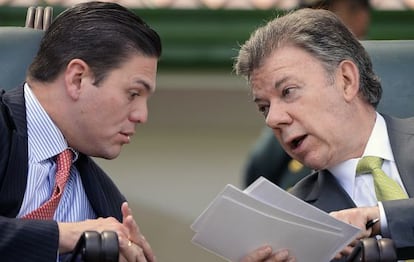Colombian leader replaces defense chief to speed up FARC peace talks
Controversial minister and current US ambassador to Washington will switch roles

In a strategic move aimed at speeding up peace talks with the Revolutionary Armed Forces of Colombia (FARC) guerrilla group, Colombian President Juan Manuel Santos has replaced his defense minister.
The former minister, Juan Carlos Pinzón, was a long-term collaborator who had taken a firm stand against the rebel insurgency, which has been fighting a war against the government for 50 years.
Pinzón is not being sent to Washington to sabotage the peace process – that would be very serious”
Pinzón has been appointed as Colombia’s new ambassador in Washington, while the current envoy, Luis Carlos Villegas, will take over as defense chief, Santos announced.
At the same time, Santos named Foreign Minister María Ángela Holguín and Gonzalo Restrepo, the president of the state-owned oil company Ecopetrol, to become part of the government’s negotiating team, which is currently holding talks in Havana with members of the FARC.
Opposition criticizes switch
Supporters of former President Álvaro Uribe, who has been a strong opponent of his successor’s decision to hold talks with the rebels, criticized Santos’s decision to swap his defense minister with the country’s US ambassador.
Senator Alfredo Rangel, an Uribe ally, wrote on Twitter: “Pinzón leaves a negative balance when it comes to security issues: there are more attacks, extortions, kidnappings and terrorism. He helped this with his tough rhetoric.”
Others believe the move was politically motivated in an effort to groom Pinzón for a presidential run.
As for Villegas, Uribe supporters told the news magazine Semana that "as ambassador, all he did was spend $40 million on a building, and as minister, the only thing he will do is help shrink the country's morale."
The talks, which were initiated in November 2012, have been moving at a slow pace. Currently, both sides are trying to come to terms with an eventual bilateral ceasefire, reparations to victims of the conflict, and transitional justice regarding war crimes.
Holguín, who will remain foreign minister, and Restrepo won’t be based permanently in Havana but will make frequent trips so that they can sit in on the negotiations, the president said.
“The moment has come to make decisions and to work even harder. Let’s not let this historical train pass us by,” said Santos.
Pinzón has been one of Santos’s closest and most-trusted aides for the past four years as defense minister, but his statements in defense of the military have made the FARC uneasy, according to some analysts. In the past, he has described FARC members as terrorists and has made remarks such as: “Of course, they live like kings [in Cuba],” and stated that “their logic is cowardly.”
But some observers believe that Pinzón’s past statements were part of the government’s strategy of putting pressure on the FARC.
“I think that Pizón’s hardline approach was approved by Santos not only to calm down [his opponents’] fears but also to quell the FARC’s own pretensions [in the peace talks],” said political analyst Juan Carlos Palou, who also believes this strategy is no longer effective at this final stage of the negotiations.
“Pinzón is not being sent to Washington to sabotage the peace process – that would be very serious,” Palou said.
Nevertheless, other observers see Villegas, who was assigned to Washington at the end of 2013 after serving as a government negotiator with the rebels, as a more conciliatory official who will play an important role during the post-conflict period.
“He was named to calm the fears of two big powerful factors that exist in Colombia: the military and the private sector and, of course, the United States,” said María Victoria Llorente, director of the Bogota-based think tank Ideas for Peace Foundation.
Tu suscripción se está usando en otro dispositivo
¿Quieres añadir otro usuario a tu suscripción?
Si continúas leyendo en este dispositivo, no se podrá leer en el otro.
FlechaTu suscripción se está usando en otro dispositivo y solo puedes acceder a EL PAÍS desde un dispositivo a la vez.
Si quieres compartir tu cuenta, cambia tu suscripción a la modalidad Premium, así podrás añadir otro usuario. Cada uno accederá con su propia cuenta de email, lo que os permitirá personalizar vuestra experiencia en EL PAÍS.
En el caso de no saber quién está usando tu cuenta, te recomendamos cambiar tu contraseña aquí.
Si decides continuar compartiendo tu cuenta, este mensaje se mostrará en tu dispositivo y en el de la otra persona que está usando tu cuenta de forma indefinida, afectando a tu experiencia de lectura. Puedes consultar aquí los términos y condiciones de la suscripción digital.








































